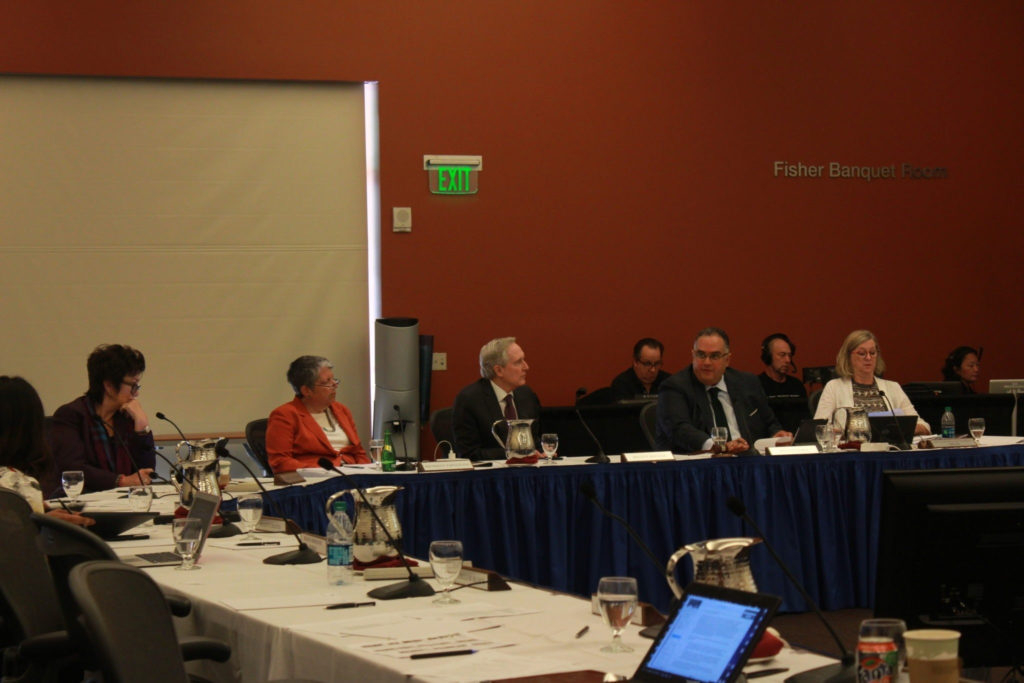The University of California Board of Regents rolled out new implementation guidelines for “generally” prohibiting outsourcing on Feb. 15, detailing how California’s largest employer will go about employing contracted workers and the services they provide.

The new guidelines build upon the original UC Regents motion from November and hinge on the practice of insourcing. Sanya kamidi / Daily Nexus
According to Andrew Gordon, UC Office of the President (UCOP) spokesperson, the new guidelines are effective immediately.
The guidelines represent the UC’s next step in its efforts to forgo outsourcing; outsourcing has been a point of contention between the UC and its unions in the past. In May 2019, American Federation of State, County and Municipal Employees (AFSCME) Local 3299, the UC’s largest union, went on a one-day strike over outsourcing concerns.
AFSCME did not respond to multiple requests for comment regarding the new guidelines.
The new guidelines build upon the original UC Regents motion from November and hinge on the practice of insourcing, which is when “[outside] service contracts are terminated or not renewed, and the work is transferred to UC employees,” according to the guidelines.
Covered services — contracted labor typically performed by union employees — are at the center of the new guidelines. According to the guidelines, the UC hopes to insource “to the fullest extent possible” moving forward.
To determine if a covered service is eligible for insourcing, the guidelines say the UC must consider “equipment needed to perform the service,” “technical skills or expertise required to perform the service” and the “law, Federal requirement, contract or grant requirement, or court decisions or orders.”
Furthermore, the guidelines say the UC must notify AFSCME when a UC campus is ready “to transition contracted covered service work.”
According to the guidelines, only certain types of covered services can continue to be outsourced, namely when it is “required by law, Federal requirement, contract or grant requirement, or court decisions or orders.”
If the UC deems an outsourced covered service necessary, the guidelines mandate that UC employees cannot be displaced as a result and that “any proposed contract for Covered Services that would result in displacement must be canceled.”
The guidelines also explain how the UC will accommodate insourced covered service workers by providing them with the matching wages — $15 an hour or more — and benefits of university employees. According to the guidelines, the UC Systemwide Human Resources office will determine the wage and benefit parity on a yearly basis.
In addition to covered service workers, the guidelines also explain how the UC should go about insourcing supplier employees, which are contractors employed by the UC to perform a specific type of work.
To become insourced as a “UC career employee,” the guidelines say supplier employees must be eligible to work in the U.S., pass a background check and perform the same services at the same campus for 1,000 hours over a 12-month period or for “35% time over” a 36-month period.
If AFSCME determines that a pending contract for covered services doesn’t comply with its collective bargaining agreement with the UC, the union has up to 14 calendar days to file a grievance with UCOP, according to the guidelines.
From there, the guidelines say UCOP has 10 days to respond to the grievance; if UCOP denies the grievance, AFSCME can file an “appeal to arbitration” within 10 days of receiving UCOP’s response.
In the case of an appeal, the guidelines say that an arbitrator will determine whether or not the UC’s pending contract for the covered service is appropriate. If it is appropriate, the contract will remain in place; if it isn’t, the contract must be terminated and the university must “stop the contracting process,” the guidelines read.















